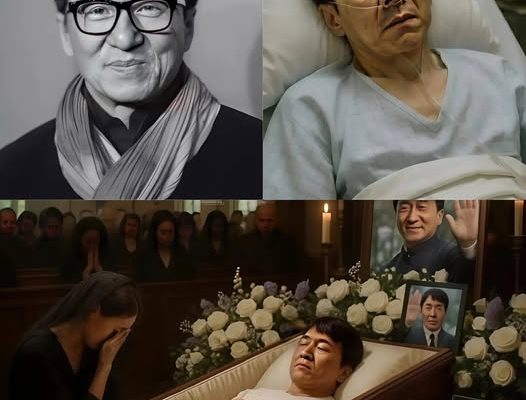In the realm of action cinema, there are stars, there are icons, and then there is Jackie Chan — a singular figure whose career redefined martial arts on screen and whose influence bridged cultures across continents. As the world bids farewell to the man who gave decades of his life to entertaining audiences, it is worth reflecting on the extraordinary journey of an artist who turned physical risk into cinematic poetry and left behind a legacy that will endure for generations.

From Humble Beginnings to Global Stardom
Born Chan Kong-sang in Hong Kong in 1954, Jackie Chan’s story began far from the glitz of Hollywood. The son of working-class parents, he was enrolled at the China Drama Academy at a young age, where he trained rigorously in martial arts, acrobatics, singing, and acting. The discipline was grueling — hours of physical training each day, strict discipline, and a constant push toward perfection.
By the time he entered the Hong Kong film industry as a stuntman in the early 1970s, Chan had developed an extraordinary physical skill set. He worked behind the scenes on Bruce Lee classics like Fist of Fury and Enter the Dragon, performing dangerous stunts that often went unnoticed by audiences but not by his peers. His combination of agility, timing, and fearlessness quickly made him a standout.
Crafting a Unique Style
When Jackie Chan began starring in his own films, he chose a path different from the stoic, invincible martial arts heroes of the time. Instead, he embraced vulnerability and humor. His characters often got hurt, stumbled, and improvised in fights, using ladders, chairs, and any object at hand. This blend of martial arts mastery, death-defying stunts, and slapstick comedy became his signature.
Movies like Drunken Master (1978) and Project A (1983) showcased his ability to choreograph action sequences that were as thrilling as they were inventive. Audiences laughed and gasped in equal measure — a testament to his understanding that action films could be both exhilarating and human.
The Pain Behind the Laughter
Jackie Chan’s commitment to performing his own stunts was both his hallmark and his greatest risk. Over his career, he suffered countless injuries — broken bones, dislocations, and near-death experiences. In Police Story (1985), he famously slid down a pole covered in lights, burning his hands and nearly breaking his spine upon landing. In Armour of God (1986), a stunt went horribly wrong, fracturing his skull and leaving him with a permanent hole in his head.
Yet Chan never wavered. His belief was simple: audiences could feel the difference between a real stunt and a simulated one. That authenticity became the soul of his work.
Conquering Hollywood
By the 1990s, Jackie Chan had already conquered the Asian market, but his dream was to win over Western audiences without compromising his style. That breakthrough came with Rumble in the Bronx (1995), which introduced his brand of action-comedy to North America. The global explosion followed with Rush Hour (1998) alongside Chris Tucker — a pairing that brought in hundreds of millions at the box office and spawned two successful sequels.
Films like Shanghai Noon, The Tuxedo, and Kung Fu Panda cemented his place as an international star. But unlike many who adapt themselves entirely to Hollywood, Chan brought his Hong Kong sensibilities to Western productions, influencing the way action sequences were choreographed and filmed.
A Cultural Bridge
Jackie Chan was more than just an entertainer; he was a cultural ambassador. His films introduced Western audiences to the rhythms and humor of Hong Kong cinema, while his international success gave Asian performers a stronger foothold in Hollywood. He often spoke about the importance of cross-cultural understanding, using his celebrity status to promote charity, disaster relief, and education.
Fluent in multiple languages and comfortable moving between vastly different cultures, he became a symbol of global unity in the entertainment industry.

Off-Screen Legacy
Beyond film, Jackie Chan’s philanthropic efforts were extensive. He donated millions to causes ranging from education to disaster recovery, and established the Jackie Chan Charitable Foundation to support young talent and those in need. His humanitarian work earned him honors from governments and organizations worldwide.
In 2016, he received an Honorary Academy Award — a rare recognition of his lifetime achievement in film, applauding not just his acting and directing, but his role in shaping the language of modern action cinema.
Farewell to a Tireless Performer
News of Jackie Chan stepping away from public life, whether due to retirement or simply choosing to slow down, has been met with mixed emotions: sadness, gratitude, and admiration. For millions, he has been a constant presence — a figure whose movies were part of their childhoods, their family weekends, and their cultural memory.
His final public appearances have shown the same humility and humor that defined his career. When asked how he wanted to be remembered, Chan reportedly said:
“As someone who worked hard, who never gave up, and who made people smile. That’s all.”
Timeless Memories on Screen
The cinematic moments Jackie Chan leaves behind are not just scenes — they are memories etched into global pop culture. The precarious ladder fight in First Strike, the mall brawl in Police Story, the clock tower fall in Project A, and countless bloopers showing him laughing through pain — all are part of his enduring charm.
His influence is visible in younger generations of filmmakers and stunt performers who cite him as their primary inspiration. Today’s action cinema — from Hollywood blockbusters to indie martial arts films — owes much to his creativity and fearlessness.
The Man Behind the Legend
What made Jackie Chan unique was not only his physical talent, but his relatability. He was never the untouchable hero; he was the underdog who got hurt, got back up, and kept fighting. In doing so, he reflected the resilience and humor people saw in themselves.
Friends and colleagues describe him as tireless on set, meticulous in planning, but generous in spirit — always ensuring his team was cared for, always giving credit where it was due.
A Legacy That Will Endure
As the curtain falls on his active years, Jackie Chan’s impact is secure. He changed how the world sees action cinema, proving that stunts could be thrilling without being senselessly violent, that martial arts could tell a story, and that humor could make even the most intense fight scene unforgettable.
For those who grew up watching him leap across rooftops, tumble through windows, and smile through broken bones, his departure feels personal. But the films remain — a library of joy, awe, and inspiration that will continue to entertain and influence for decades.
Conclusion: Goodbye, But Never Forgotten
In saying goodbye to Jackie Chan’s active career, we are not closing a chapter, but celebrating a lifetime of artistry and courage. His youth was spent in service to the craft he loved, and the memories he leaves behind belong not just to cinema, but to the millions of hearts he touched.
Jackie Chan may step back from the set, but his laughter, his daring, and his humanity will keep running, jumping, and smiling on screens around the world — forever.



